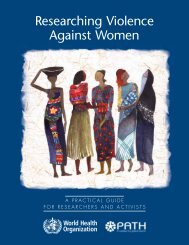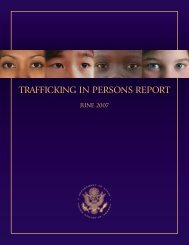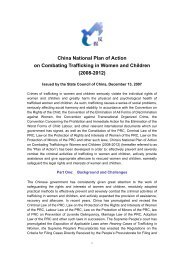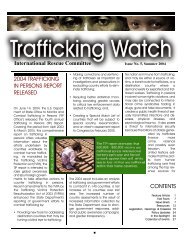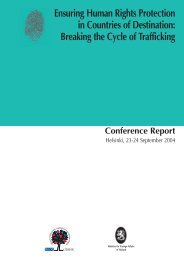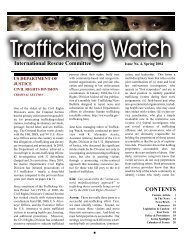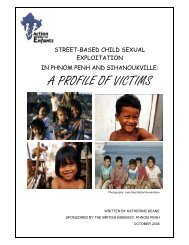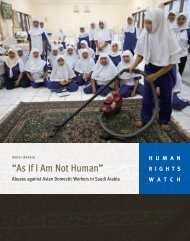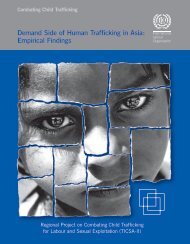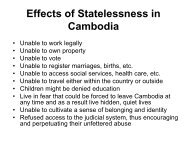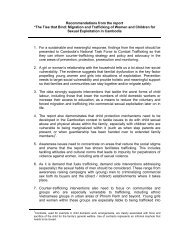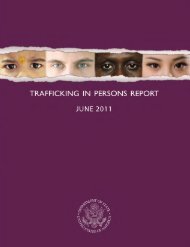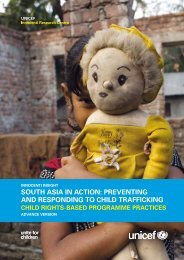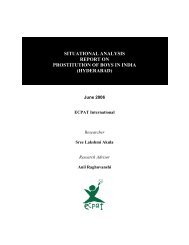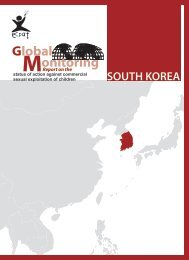Download PDF - Violence Against Children - East Asia and the ...
Download PDF - Violence Against Children - East Asia and the ...
Download PDF - Violence Against Children - East Asia and the ...
Create successful ePaper yourself
Turn your PDF publications into a flip-book with our unique Google optimized e-Paper software.
Cambodia<br />
The Law Enforcement <strong>Against</strong> Sexual<br />
Exploitation of <strong>Children</strong> (LEASEC) project<br />
was launched in April 2000 with <strong>the</strong> signing of<br />
a Memor<strong>and</strong>um of Underst<strong>and</strong>ing.<br />
The overall goal of this project, now in its<br />
fourth year, has been to improve <strong>the</strong><br />
capabilities of police, judges <strong>and</strong> prosecutors<br />
to investigate cases of sexual exploitation of<br />
children, including rescue of victims,<br />
development of referral systems, arrest of<br />
offenders <strong>and</strong> initiation of court proceedings.<br />
Partners in this process<br />
The Ministry of <strong>the</strong> Interior has implemented<br />
<strong>the</strong> LEASEC project with technical <strong>and</strong> financial<br />
assistance from all five partners named above.<br />
The project has three main strategies:<br />
1. To assist <strong>the</strong> Ministry of <strong>the</strong> Interior to<br />
develop Police Operating Procedures <strong>and</strong><br />
Practices, in order to improve <strong>the</strong><br />
efficiency <strong>and</strong> effectiveness of <strong>the</strong> Royal<br />
Cambodian Police in investigation of cases<br />
of child sexual exploitation, including <strong>the</strong><br />
rescue of victims, use of referral services,<br />
arresting offenders <strong>and</strong> initiating court<br />
proceedings.<br />
2. To sensitise police officers in 13 provinces<br />
<strong>and</strong> municipalities to <strong>the</strong> issue of sexual<br />
exploitation, including psycho-social<br />
aspects of <strong>the</strong> problem, through<br />
dissemination of relevant legislation,<br />
police operating procedures, <strong>and</strong> <strong>the</strong><br />
development of basic investigation skills.<br />
3. To provide in-depth training to a limited<br />
number of police officers, as well as two<br />
prosecutors <strong>and</strong> two investigating judges<br />
from Phnom Penh, in techniques for <strong>the</strong><br />
investigation of sexual exploitation <strong>and</strong><br />
abuse. Training is applied with a 24-hour<br />
Police telephone hotline for cases to be<br />
reported from <strong>the</strong> public.<br />
The methodology is one of training of<br />
trainers, development of training <strong>and</strong><br />
development of materials to sensitise police<br />
<strong>and</strong> courts to <strong>the</strong> issue of child sexual<br />
exploitation. The materials are multidisciplinary<br />
<strong>and</strong> use various approaches. In<br />
order to gain police support, a two-day<br />
briefing was conducted for all Provincial <strong>and</strong><br />
Municipal Commissioners of Police, as well as<br />
Deputy Commissioners for <strong>the</strong> Judicial Police<br />
Branch <strong>and</strong> for <strong>the</strong> Scientific <strong>and</strong> Technical<br />
Branch. An Investigations Team established in<br />
Phnom Penh provides support for <strong>the</strong>ir dayto-day<br />
work as well as on-<strong>the</strong>-job training.<br />
Technical assistance, through <strong>the</strong> services of<br />
one International Police expert, one short-term<br />
consultant on Police Operating Procedures,<br />
<strong>and</strong> one short-term Training Consultant, is<br />
provided along with material support.<br />
Impact of <strong>the</strong> project<br />
The LEASEC project was one of 11 examples of<br />
“good practice” in <strong>the</strong> <strong>Asia</strong> region to be<br />
highlighted in an Education <strong>and</strong> Social<br />
Commission for <strong>Asia</strong> <strong>and</strong> <strong>the</strong> Pacific (ESCAP)<br />
report 27 in preparation for <strong>the</strong> Second World<br />
Congress in December 2001, with <strong>the</strong><br />
comment: “It advances <strong>the</strong> objectives of numerous<br />
international agreements <strong>and</strong> declarations…<strong>and</strong><br />
meets an urgent need for improved police response<br />
to child sexual exploitation”. Coordination of<br />
resources <strong>and</strong> expertise among donor agencies<br />
<strong>and</strong> close collaboration with relevant<br />
government Ministries have added to <strong>the</strong><br />
efficiency of this response.<br />
During <strong>the</strong> first phase of <strong>the</strong> project, from<br />
April 2000 to March 2002, several materials<br />
were developed: Legal <strong>and</strong> Technical<br />
Documents for Investigators, <strong>and</strong> Training<br />
Materials, including a sensitisation video film<br />
“The Victim” which was recently broadcast<br />
on all Cambodian television channels.<br />
The second task of <strong>the</strong> project was to<br />
conduct training programs, including training<br />
of trainers, for a senior Investigation<br />
Coordination Team 28 <strong>and</strong>:<br />
• 20 members of <strong>the</strong> Investigation Network<br />
in Phnom Penh<br />
• 44 Provincial/Municipal Police<br />
Commissioners <strong>and</strong> First Deputy Police<br />
Commissioners<br />
27 UNICEF/ESCAP, <strong>Asia</strong>-Pacific Answers: <strong>East</strong> <strong>Asia</strong> <strong>and</strong> <strong>the</strong> Pacific Regional Consultation for <strong>the</strong> Second World Congress <strong>Against</strong> Commercial Sexual Exploitation of<br />
<strong>Children</strong>, UNICEF/ESCAP, 2001<br />
28 The police force has many levels <strong>and</strong> different areas of operational responsibility. The project has emphasised coordination between <strong>the</strong> different groups.<br />
The Investigation Coordination Team consists of more senior police who endorse <strong>and</strong> support <strong>the</strong> actual investigations carried out by a small Investigations<br />
Team of 3–5 officers. The Investigation Network (mentioned in <strong>the</strong> following bullet point) liaises between members of <strong>the</strong>se groups.<br />
42



